
Conveyor belts have long been the heart of modern manufacturing, logistics, and distribution. From speeding up product handling to improving workplace safety, these systems help companies in every industry streamline their operations. If you’ve ever wondered which conveyor might suit your business needs—or if you just want to learn more about the incredible variety of conveyor technologies available—this guide is for you.
Below, we’ll explore why conveyor belts are so essential, highlight different types of conveyor systems, and dive into industry-specific requirements.
Why Conveyor Belts Are Essential Across Industries
Conveyor belts serve as the backbone of material transport in an array of industries—from food processing and pharmaceutical manufacturing to automotive assembly and e-commerce fulfillment. Their primary role is to move products in an efficient, consistent manner, replacing or reducing manual labor and minimizing the risk of human error.
The benefits of using conveyor belts are numerous and include:
- Reduced Labor Costs: By automating the movement of goods, facilities can reduce manual handling tasks and reallocate labor elsewhere.
- Improved Safety: Fewer repetitive tasks and heavy lifting requirements mean fewer worker injuries.
- Greater Throughput: Conveyors can operate around the clock with minimal downtime, pushing more product through your facility in less time.
- Consistent Quality Control: A well-designed conveyor can help maintain product integrity from start to finish.
Key Conveyor Types & Their Applications
When it comes to conveyor systems, one size does not fit all. Different environments and products require different levels of durability, hygiene, load capacity, and design flexibility. Below are some of the most common conveyor types you’ll find—and how each can be applied in various industries.
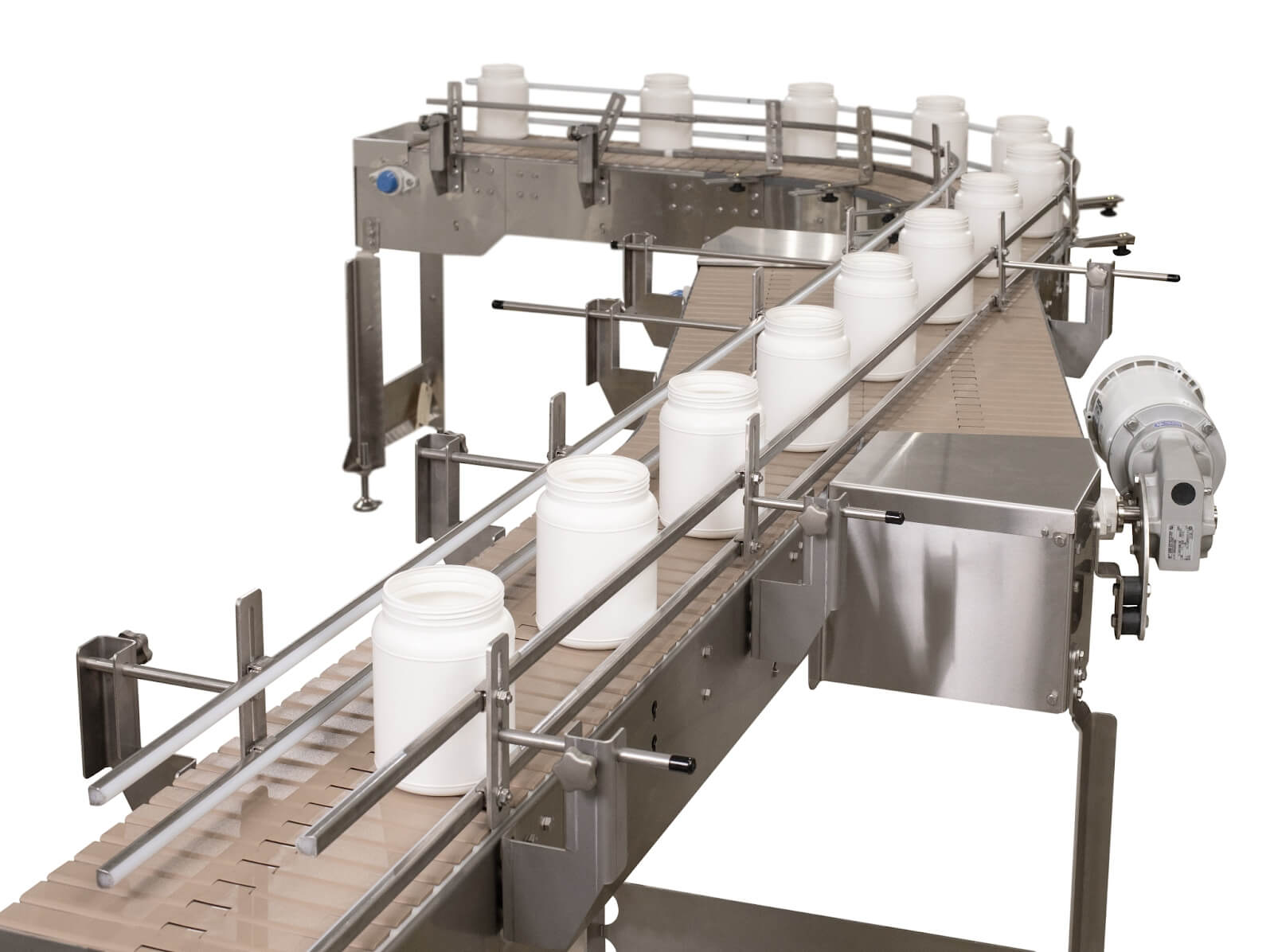
Sanitary Conveyors
Sanitary conveyors take cleanliness to the next level, featuring stainless steel frames, FDA-approved belting, and fast, thorough washdown designs. They’re critical in food, pharmaceutical, and cosmetic environments where hygiene and regulatory compliance (BISSC, USDA, FDA) are key.
- Tool-less disassembly saves time during cleaning.
- Welded stainless-steel frames reduce bacterial harborage points.
- FDA-approved belting and plastic components
These conveyors ensure products like baked goods, meat and poultry, or ready-to-eat items remain contamination-free, making them ideal for the food handling industry.
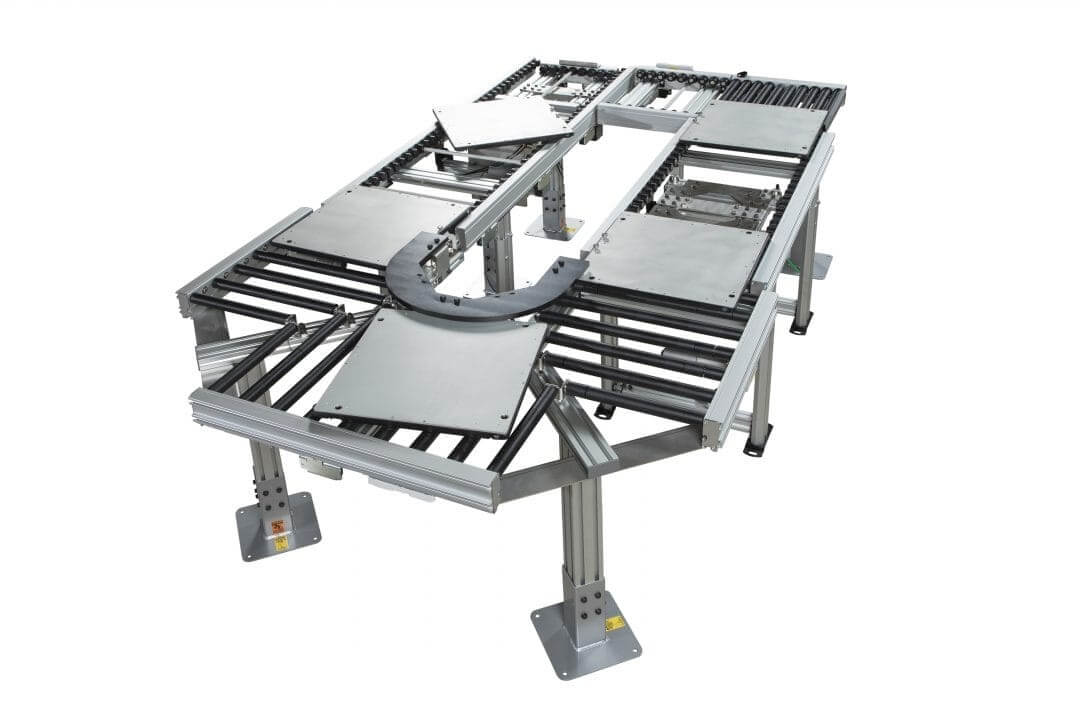
Pallet Systems
Pallet systems specialize in precise product positioning and the ability to integrate sensors and Industry 4.0 technology . They often utilize dual timing belts or edge roller technology (ERT) to move pallets gently and accurately, great for automated and robotic production lines.
- ± 0.5 mm product placement accuracy.
- Pin tracking for simple, cost-effective navigation of corners.
- Cleanroom-rated options (ERT) for dust-sensitive processes like electronics or medical devices.
Whether you’re assembling electronics, inspecting automotive components, or indexing products for testing, pallet system conveyors help keep products aligned and on track.
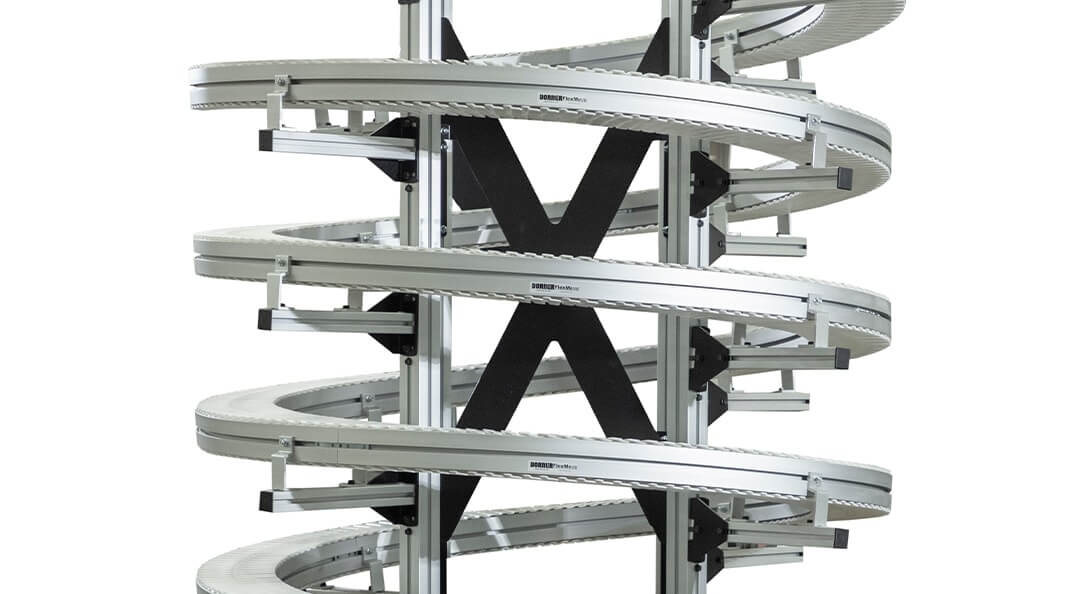
Flexible Chain Conveyors
Flexible chain conveyors (like Dorner’s FlexMove line) easily navigate curves, inclines, and declines, saving valuable floor space and simplifying complex layouts. They’re a go-to choice in packaging, e-commerce, and integrator applications where product lines often merge, divert, and change elevation.
- Plastic chain belts come with friction inserts, rollers, or cleats.
- Modular design means you can quickly reconfigure to meet new production goals.
- Aluminum or stainless frames handle diverse environments, from dry to light washdown.
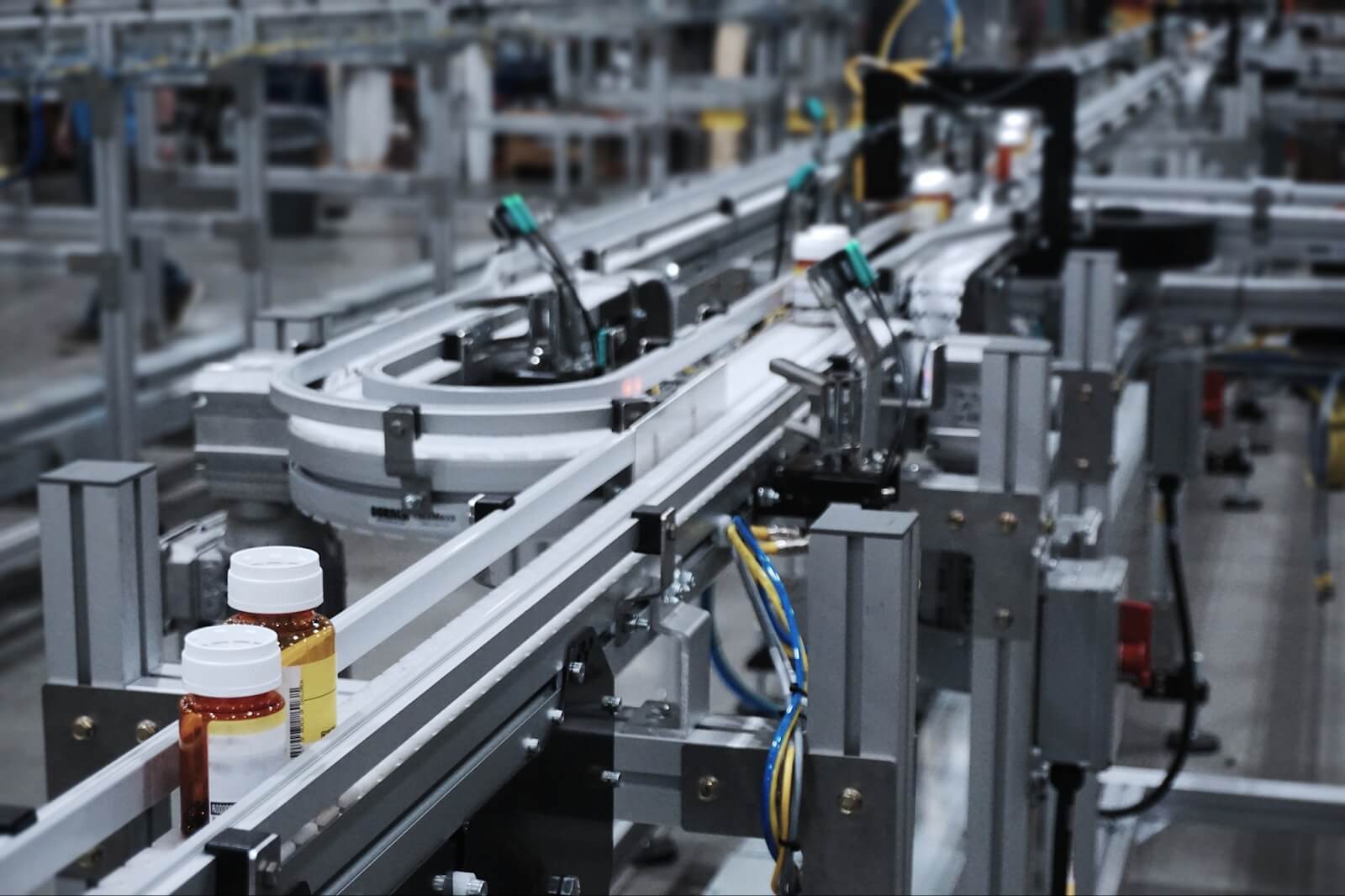
Aluminum & Stainless Frame Belted Conveyors
For general manufacturing needs, aluminum-frame conveyors offer durability in a lightweight package. Stainless steel frames, on the other hand, provide extra corrosion resistance for harsh or damp environments.
- Low-profile designs integrate easily with existing machinery.
- Cleated belts manage inclines and declines efficiently.
- Heavy-duty options (like DCMove or the 3200 series) handle large loads in industrial settings.
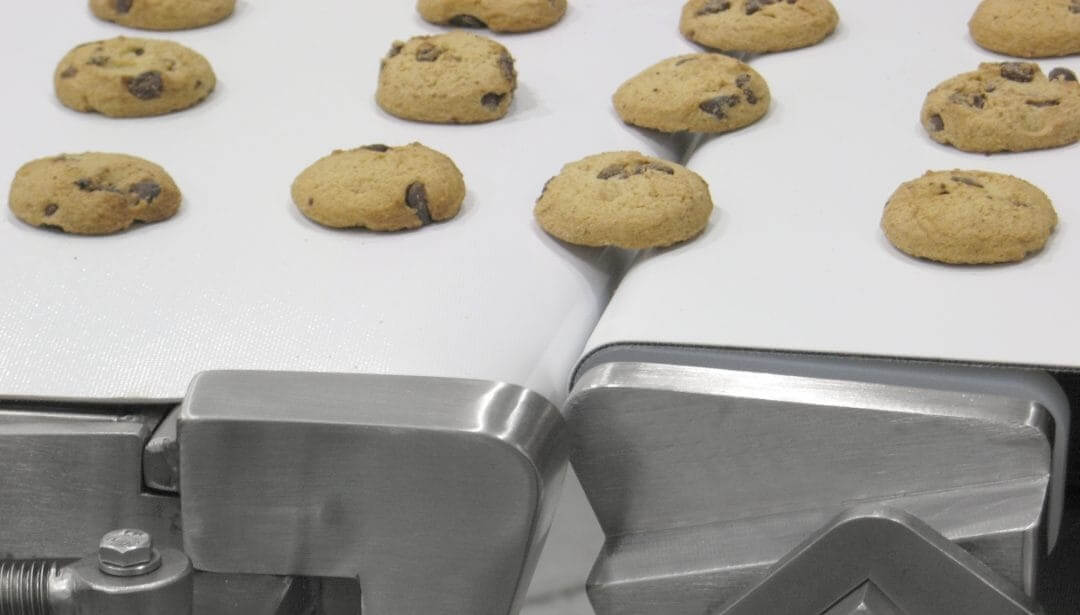
A Closer Look at Conveyor Belt Types
Beyond the frame style and overall conveyor design, belt choice is equally crucial. Dorner offers fabric conveyor belts, modular conveyor belts, and flexible chain conveyor belts—each with specific advantages and application niches.
Fabric Conveyor Belts
Fabric belts feature multiple layers, including a strength layer (often polyester or nylon) and various cover materials (like PVC, TPU, or silicone). They’re typically low-profile and support smaller pulley diameters, making them ideal for tighter spaces or more precise product handling.
- Woven or nonwoven designs.
- Suitable for automation, material handling, and FDA food processing (when the right cover material is chosen).
- Can be customized for high- or low-temperature applications.
Modular Conveyor Belts
If you need easy cleaning, robust durability, or the ability to handle open-surface tasks like draining, cooling, or spraying, consider modular conveyor belts:
- Modular plastic segments reduce fraying, delamination, and mechanical joining failures.
- Open-hinge designs simplify debris removal and rinse-down.
- Excellent for bakery, dairy, and medical processes where cleaning is frequent.
Flexible Chain Conveyor Belts
Flexible chain belts excel in complex layouts with multiple curves, inclines, and declines within one conveyor run:
- Open belt sides allow the chain’s knuckle to move down the center track.
- Often used in manufacturing, bottling, secondary packaging, and automation lines.
- Compatible with AquaGard 7100 Series and Dorner’s FlexMove platform.
Industry-Specific Conveyor Considerations
Each industry has its own unique challenges and regulations. Choosing the right conveyor means balancing cost, efficiency, sanitation, and compliance—and a one-size-fits-all approach rarely works.
Food Processing & Handling
Food-grade conveyors must resist bacteria build-up and handle daily, often rigorous washdowns. Sanitary conveyors with removable wear strips, minimal horizontal surfaces, and quick belt removal features enable frequent and thorough cleaning—critical for maintaining safety and preventing contamination.
Consumer Packaged Goods (CPG)
From home goods and cleaning products to cosmetics, CPG lines often juggle multiple SKUs on a single production line. Conveyors that allow rapid changeovers, simple merges, and effective packaging inspection stations help keep throughput high and downtime low.
Material Handling & Industrial
Industrial environments can be tough—conveyors often face heavy loads, dust, or abrasive conditions. Robust frames, powerful motors, and pallet systems are often favored in metalworking, automotive, or machine tool shops, ensuring conveyors withstand continuous, demanding operations while offering a high rate of accuracy and repeatability.
Medical & Pharmaceutical
When it comes to medical devices or pharmaceutical products, cleanliness, traceability, and gentle handling are paramount. Belt-free rollers or cleanroom-rated conveyors, such as Dorner’s ERT series, minimize product contact points and adhere to stringent FDA and GMP guidelines.
E-Commerce & Packaging
For high-volume shipping and fulfillment centers, speed and accuracy are everything. Flexible chain conveyors can accommodate multiple merges and diverts in a limited footprint, while robust scanning and labeling systems integrate seamlessly for error-free order fulfillment.
Automation & Integrators
System integrators often seek conveyors that easily connect to robotic arms, sensors, PLCs, or vision systems. Pallet systems with precision indexing or flexible chain conveyors with modular construction are ideal for creating automated assembly and packaging lines that can adapt to rapid changes.
Designing Your Conveyor Solution
Selecting the right conveyor system starts with analyzing production requirements, space constraints, and product characteristics. Consider factors like the product’s weight, size, and fragility. Ask questions about sanitation requirements, environment (e.g., washdown vs. dry), and potential for future expansions.
Begin your design process by:
- Identifying Production Goals: Throughput, level of automation, and floor space.
- Understanding Compliance: Industry regulations like FDA or USDA for sanitary environments.
- Planning for Growth: Designing flexible, modular solutions that scale with changing demands.
Maintenance & Aftermarket Services
No matter how advanced your conveyor is, regular maintenance is crucial for maximizing its service life. Dorner’s Parts & Services program offers:
- Parts Auditing to check for wear and tear before it becomes critical.
- Preventative Maintenance schedules to reduce downtime.
- Installation & Training so your workforce can quickly adapt to new systems and procedures.
By investing in maintenance and using original replacement parts, you keep your conveyor running smoothly and minimize the risk of costly disruptions.
Why Choose Dorner?
With over 50 years of experience and a global footprint, Dorner is an industry leader in intelligent conveyor solutions. Our conveyors come backed by an industry-leading 10-year warranty, guaranteeing peace of mind and long-term value.
Other benefits include:
- Lean manufacturing and fast lead times—some models ship in as little as 72 hours.
- Comprehensive product range, from light-duty to sanitary, pallet, and flexible chain systems.
- Customization options via our DTools configurator, ensuring each conveyor fits your exact application.
Whether you’re a small startup in need of a single conveyor or a multinational enterprise looking to upgrade an entire facility, Dorner has the expertise, products, and aftermarket support to help you succeed.
Getting Started with DTools
One of Dorner’s core advantages is DTools, our user-friendly CAD/configurator platform. With DTools, you can design a conveyor system tailored to your specific environment—from belt material and drive options to accessories and frame construction.
How It Works:
- Create an Account: Sign up quickly and start a new project.
- Select Your Conveyor Type: Sanitary, pallet, flexible chain, or standard belted.
- Customize Specs: Dimensions, belt materials, drive configurations, and more.
- Download CAD Models: Integrate the 2D or 3D design into your facility layout.
- Request a Quote: Submit your design to receive pricing and lead time information.
DTools removes the guesswork and cuts design timelines, helping you move from concept to live production as efficiently as possible.
Get started with DTools on our homepage.
Ready to Transform Your Production Line?
Conveyors aren’t just about moving products—they’re about maximizing efficiency, maintaining safety and quality standards, and future-proofing your operation. Whether you’re aiming to optimize a food processing line with sanitary conveyors, set up an automated pallet system for high-precision assembly, or streamline e-commerce packaging with flexible chain solutions, Dorner is ready to help.
Contact us today or get started in DTools to configure your custom conveyor system. Our team of specialists will guide you every step of the way, ensuring you choose a conveyor setup that meets your exact requirements while positioning your business for long-term success.





